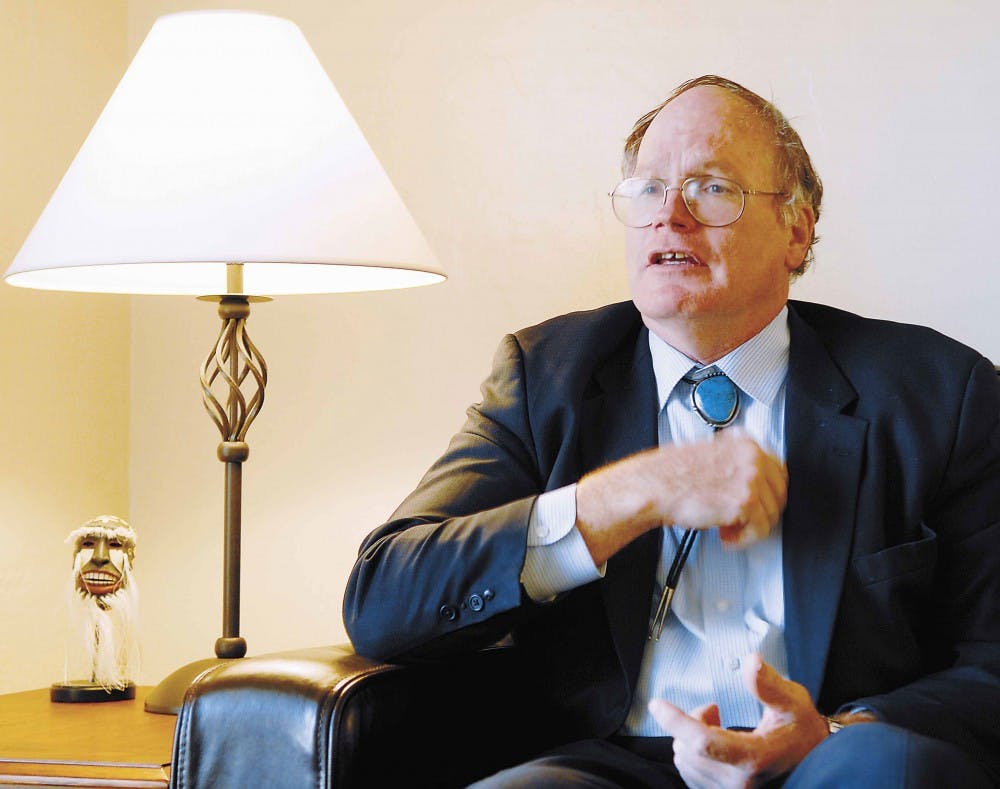by Caleb Fort
Daily Lobo
Before Steve Walsh went to school to get a doctorate in 1990, he made about $250,000 per year on the payroll of several high-tech companies.
"Then I went and paid thousands of dollars a year to get that degree, and as a teacher, I get paid substantially less than half of what I made before that," he said. "I like it when I help other people do well. I guess that's not good from a greedy, capitalist viewpoint."
Walsh, a professor of technology management at the Anderson Schools of Management, was named as the 2006 recipient of the Micro and Nanotechnology Commercialization Education Foundation lifetime achievement award for his work in nano and microtechnology.
Get content from The Daily Lobo delivered to your inbox
The foundation, of which Walsh was the founding president, is a nonprofit organization dedicated to commercializing micro and nanotechnology, which is the manipulation of matter at the atomic level.
Nanotechnology is nothing new, Walsh said.
"One could look at photosynthesis as nanotechnology," he said. "When you do deal with manipulating steel or working with clay, there are often nano-sized structures involved. The only thing that's new at all is the deliberate engineering of those structures."
Walsh said it's important to offer specialized degrees for technology management.
"If you're a general manager, you generally don't know anything," he said. "It's like when you go to a restaurant and ask the waiter what the best thing on the menu is, and they tell you everything's good. It probably means that nothing is good."
Walsh works with several national nanotechnology programs, including those in the Netherlands, Germany and Australia.
Some of the first important applications of nanotechnology will be in medicine, Walsh said.
For example, it might be possible to engineer small particles that could attack cancer cells without harming the surrounding tissue, he said.
"Right now, we treat the system," he said. "We don't treat the disease. It would be great if that could change."
Nanotechnology could also be used for people to diagnose themselves for various health problems, he said.
Although there are many potential benefits from the commercialization of nanotechnology, many people are scared of it, he said.
"There's ethical issues around every new technology - nuclear research, automotive technology - there's always a concern," he said. "Is it good to be wary? Yes, of course you should be careful."
Nanotechnology has already become commercially available, although many people don't know it, he said.
For example, cosmetics company L'Oreal holds many patents for nanotechnology, according to an article on Small Times magazine's Web site.
Nanoparticles are used in products such as moisturizers and lotions because they allow ingredients such as vitamin A to penetrate deeper into the skin.
"I think the fact that L'Oreal makes such extensive use of nanotechnology but doesn't advertise it at all - I think it tells you that they're scared that people would be wary of their products," he said.
There are dangers from nanotechnology, Walsh said.
"One thing that's bad is if you inhale nanoparticles into your lungs," he said. "But we found that out with asbestos. We found that out with coal dust. We've known it for a long time, but now that it's called nanotechnology, it's suddenly more scary to some people."
Some people's fear of technology should not interfere with the potential benefits, he said.
"My father died of heart disease when he was 60," he said. "It's conceivable that small-tech could get in there and clean out plaque. If other people don't want to do that, that's fine, but I want to live another 15 years."






